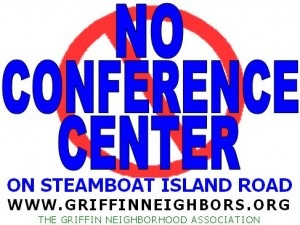A Declaration of Interdependence
The property rights movement, which has been gaining increasing political power in Washington state, proposes an interesting foundation for human rights: property ownership. Citizens' Alliance for Property Rights, a Washington group that backs I-933, the "property fairness" initiative, tells us that "Property rights are really human rights and the very foundation of a free society."
So, what about the rights of people who don't own property?
Imagine a patch of woods owned by a dozen families. Right in the center flows a stream where salmon swim. These woods and stream connect with wetlands that drain into a public reservoir and a neighborhood lake where children splash and play in the summer. In a basic sense, every member in this community is part owner of these waterways that travel through private and public land. Homeowners, homeless people, and apartment-dwellers alike drink and swim in clean, sparkling water and are legally prohibited from poisoning it or blocking its flow.
In November, Washingtonians will vote on Initiative 933, known variously as the "property fairness" and "developers' loophole" initiative. If I-933 passes and the courts uphold it, a broad range of environmental and zoning restrictions on private property will be redefined as government "damage" to property. Most likely, the owners of that small patch of woods will be permitted under I-933 to build right up to the edge of their stream — or demand financial compensation from the state for the fair market value of that lost commercial opportunity. Oregon passed a similar but less extreme law, Measure 37, and property owners are filing hundreds of claims demanding many millions of dollars from the state.
Air and water don’t obey property boundaries. Transmission fluid running off a quickie mart parking lot into a stream will enter the blood of a nursing mother and baby who never go near that property. I-933 denies this physical reality of our connectedness. It denies as well the social reality that all people share the responsibilities and benefits of livable communities, whether we own land or not.
It is no wonder that over 200 Washington organizations including the Sierra Club, the Washington chapter of Republicans for Environmental Protection, the Affiliated Tribes of Northwest Indians, and the Washington State Council of Firefighters ask us to vote NO on I-933. Washington State Grange, which has not taken an official position, warns that it finds cause for concern to agricultural lands in I-933. Sightline Institute tells us that it will cost over a billion dollars per year to administer. Washington’s Department of Ecology tells us that it will deprive Washington of the ability to regulate its own waterways and air.
And yet there is a good chance that I-933 will pass. Why?
• Special interest support
I-933 gains tremendous power from the funding of developers who will gain financially from the overthrow of Washington’s environmental laws. It is also supported by organizations that believe, as Grover Norquist said in 2001, that government should be made small enough “to drown in the bathtub.” The biggest financial contributor to I-933, $200,000 so far, is Americans for Limited Government, an Illinois group that is funding tax and environmental law rollbacks in 10 states this year.
• Private citizen support
I-933 also has significant support from private citizens.
In both urban and rural areas, laws protecting increasingly vulnerable resources have proliferated, impacting property owners. Property taxes have become increasingly unfair. Poor people, the middle class, and small businesses pay much more than the wealthy and experience more hardship from inadequate public services. Washington farmers are in trouble. Some communities lose several farms per winter. Some wheat growers receive less per bushel of wheat in 2005 than they did in 1948. Too many people in farm country are eligible for food stamps. In such conditions, it is natural that people will assert their private property rights.
But I-933 is not the answer. It has a fatal flaw, proposing to protect private property while ignoring the common good.
The environmental movement has been criticized for the opposite mistake: fighting for ecological protection while ignoring the economic welfare of individuals. In recent years, environmentalism has been learning from this mistake.
Private rights and the common good are interdependent. They cannot be effectively protected in isolation from each other. Property values fall in blighted neighborhoods. People suffering from economic injustice are unlikely to support laws that protect the environment. It is time to leave failed ideas behind us and adapt to current realities. Washington faces profound environmental and economic challenges. We can meet them successfully only if we learn to protect people, communities, and the environment together.
By NOEMIE MAXWELL, Institute for Washington’s Future
Noemie Maxwell is on the board of the Institute for Washington’s Future, a nonprofit research and education center dedicated to the renewal of progressive values: community, equity, participation, and a sound environment.
Originally posted at http://realchangenews.org/2006/2006_09_06/declaration.html


